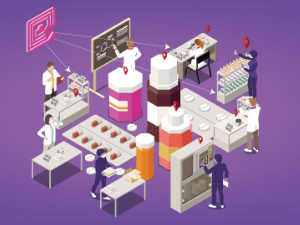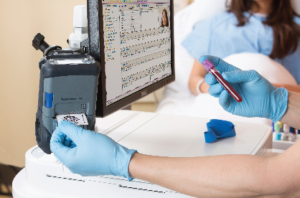
Medizinische RFID-Anwendung 1
Medical Equipment Management: Effective management of equipment is crucial for patient safety and healthcare service efficiency within medical institutions. Traditional equipment management methods often rely on manual recording and searching, leading to inefficiency and potential errors. With the implementation of RFID technology, each device can be associated with a unique RFID tag, enabling automatic tracking and management. Healthcare personnel can easily access the device’s location, status, and maintenance records using RFID readers, thus improving equipment utilization and maintenance efficiency to provide better healthcare services to patients.
Patientenidentifikation: Ensuring accurate patient identification is essential for the safety and effectiveness of medical procedures. Traditional identification methods, such as manual verification of identity cards or medical cards, are prone to errors and confusion. By embedding RFID tags on patients’ wrists or medical cards, healthcare professionals can quickly and accurately retrieve patient identification information using RFID readers, synchronizing with electronic medical record systems in real-time. This not only improves the accuracy of diagnosis and treatment but also reduces patient waiting time, enhancing the overall patient experience.
Medication Tracking: The safe usage and tracking of medications are crucial issues in the healthcare industry. Traditional medication tracking methods often rely on manual recording and inventory management, which can lead to errors and omissions. RFID technology can enable automatic tracking and management of medications by embedding RFID tags on the packaging. Healthcare facilities can monitor real-time inventory status, expiration dates, und Nutzungsaufzeichnungen, ensuring the safety and efficacy of medications. Außerdem, RFID technology can assist healthcare institutions in swiftly locating and recalling affected medications in emergency situations, reducing patient risks.

Medizinische RFID-Anwendung 2
Challenges and Outlook: Although RFID technology brings many benefits to medical applications, it also faces challenges. Privacy and security issues are the focal points, emphasizing the importance of ensuring patient and medical data security. zusätzlich, addressing the cost, device compatibility, and standardization of RFID systems is crucial. In der Zukunft, with technological advancements and accumulated application experience, RFID technology is expected to play a more significant role in the healthcare field, further improving the quality and efficiency of healthcare services.
Fazit: RFID technology holds vast prospects and potential in medical applications. Through its applications in medical equipment management, Patientenidentifikations, Medikamentenverfolgung, und mehr, RFID technology achieves automation and real-time tracking of medical processes, enhancing healthcare service efficiency and patient safety. jedoch, it is necessary to address challenges such as privacy and security concerns while continuously driving technological development and standardization to maximize the utilization of RFID technology in the healthcare sector.





